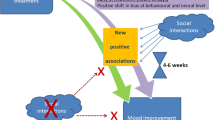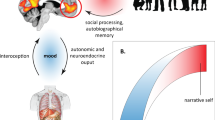Abstract
In their commentary on our earlier review (Coyne & Gotlib, 1983), Segal and Shaw minimize the problems faced by the cognitive approach to the study of depression. Their repeated references to cognitive processes that are latent and therefore not reported by subjects represent a substantial retreat from empiricism. In general, the notion of schema or schematic processing remains problematic. Published research does not support the existence of an identifiable cognitive vulnerability to depression. Other conceptual, methodological, and empirical difficulties are noted. We argue that the central defect in current cognitive approaches to depression is their inattention to the difficulties faced by depressed persons in their everyday environments, how they cope, and with what consequences.
Similar content being viewed by others
References
Abramson, L. Y., Seligman, M. E. P., & Teasdale, J. D. (1978). Learned helplessness in humans: Critique of reformulation.Journal of Abnormal Psychology, 87 49–74.
Beck, A. T. (1967).Depression: Clinical, experimental and theoretical aspects. New York: Harper & Row.
Beck, A. T. (1984). Cognition and therapy.Archives of General Psychiatry, 41 1112–1114.
Coyne, J. C., & Gotlib, I. H. (1983). The role of cognition in depression: A critical appraisal.Psychological Bulletin, 94 472–505.
Coyne, J. C., Kessler, R. C., Tal, M. Turnbull, J., Wortman, C., & Greden, J. (in press). Living with a depressed person.Journal of Consulting and Clinical Psychology.
Eaves, E., & Rush, A. J. (1984). Cognitive patterns in symptomatic and remitted unipolar depression.Journal of Abnormal Psychology, 93 31–40.
Hamilton, E. W., & Abramson, L. Y. (1983). Cognitive patterns and major depressive disorder: A longitudinal study in a hospital setting.Journal of Abnormal Psychology, 92 173–184.
Heil, J. (1983).Perception and cognition. Berkeley: University of California Press.
Klein, D. F. (1974). Endogenomorphic depression.Archives of General Psychiatry, 31 447–454.
Kovacs, M., & Beck, A. T. (1978). Maladaptive cognitive structures in depression.American Journal of Psychiatry, 135 525–533.
Lewinsohn, P. M., Steinmetz, J. L., Larsen, D. W., & Franklin, J. (1981). Depression-related cognitions: Antecedents or consequence?Journal of Abnormal Psychology, 90 213–219.
Metalsky, G. I., Abramson, L. Y., Seligman, M. E. P., Semmel, A., & Peterson, C. (1982). Attributional styles and life events in the classroom: Vulnerability and invulnerability to depressive mood reactions.Journal of Personality and Social Psychology, 43 612–617.
Platt, J. (1964). Strong inference.Science, 146 347–352.
Reda, M. A. (1984). Cognitive organization and antidepressants: Attitude modification during amitriptyline treatment in severely depressed individuals. In M. A. Reda & M. J. Mahoney (Eds.),Cognitive psychotherapies (pp. 119–149). Cambridge, Massachusetts: Ballinger.
Riskind, J. H., & Rholes, W. S. (1984). Cognitive accessibility and the capacity of cognitions to predict future depression: A theoretical note.Cognitive Therapy and Research, 8 1–12.
Riskind, J. H., & Steer, R. E. (1984). Do maladaptive attitudes “cause” depression?: Misconception of cognitive theroy.Archives of General Psychiatry, 41 1111.
Rush, A. J., & Giles, D. E. (1982). Cognitive therapy: Theory and research. In A. J. Rush (Eds.),Short-term psychotherapies for depression. New York: Guilford Press.
Sacco, W. P., & Beck, A. T. (1985). Cognitive therapy depression. In E. Beckham & W. R. Leber (Eds.),Handbook of depression: Treatment, assessment, and research (pp. 3–38). Homewood, illinois: Dorsey Press.
Shaw, B. F. (1979). The theoretical and empirical foundations of a cognitive model of depression. In P. Pliner, I. Spigel, & K. Blankstein (Eds.),Perception of emotion in self and others. New York: Plenum.
Silverman, J. S., Silverman, J. A., & Eardley, D. A. (1984a). Do maladaptive attitudes cause depression?Archives of General Psychiatry, 41 28–30.
Silverman, J. S., Silverman, J. A., & Eardley, D. A. (1984). Reply to Riskind and Steer.Archives of General Psychiatry, 41 1112.
Simons, A. D., Garfield, S. L., & Murphy, G. E. (1984). The process of change in cognitive therapy and pharmacotherapy of depression: Changes in mood and cognition.Archives of General Psychiatry, 41 45–51.
Weissman, A. N., & Beck, A. T. (1978).Development and validation of the Dysfunctional Attitude Scale: A preliminary investigation. Paper presented at the meeting of the American Educational Research Association, Toronto, Canada.
Williams, J. M. G. (1985). Attributional formulation of depression as a diathesis-stress model: Metalsky et al. reconsidered.Journal of Personality and Social Psychology, 48 1572–1575.
Author information
Authors and Affiliations
Rights and permissions
About this article
Cite this article
Coyne, J.C., Gotlib, I. Studying the role of cognition in depression: Well-trodden paths and cul-de-sacs. Cogn Ther Res 10, 695–705 (1986). https://doi.org/10.1007/BF01173755
Issue Date:
DOI: https://doi.org/10.1007/BF01173755




